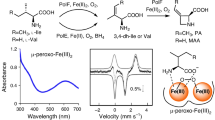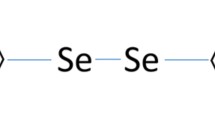Abstract
MEASUREMENTS of the rate of consumption of lead tetra-acetate, when used in strictly comparable conditions to oxidize various isomeric polyhydroxystearic acids, have revealed marked differences between the speed of oxidation of isomeric forms. We have observed these differences both in the two isomeric 9, 10-dihydroxystearic acids (m.p. 95° and 132°) and in the four known forms of 9, 10, 12, 13-tetrahydroxystearic acids (m.p. 173°, 163°, 146° and 134°). Further measurements are in progress in the group of tetrahydroxy-acids, and the complete results of this work will be reported in fuller detail later.
This is a preview of subscription content, access via your institution
Access options
Subscribe to this journal
Receive 51 print issues and online access
$199.00 per year
only $3.90 per issue
Buy this article
- Purchase on SpringerLink
- Instant access to the full article PDF.
USD 39.95
Prices may be subject to local taxes which are calculated during checkout
Similar content being viewed by others
References
Criegee, Ber., 64, 260 (1931); 65, 1770 (1932). Ann., 507, 159 (1933).
Author information
Authors and Affiliations
Rights and permissions
About this article
Cite this article
HILDITCH, T., JASPERSON, H. Rates of Oxidation of Isomeric Dihydroxy- and Tetrahydroxy-stearic Acids by Lead Tetra-acetate. Nature 147, 327 (1941). https://doi.org/10.1038/147327a0
Issue date:
DOI: https://doi.org/10.1038/147327a0



